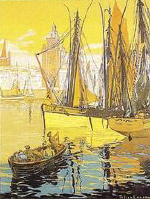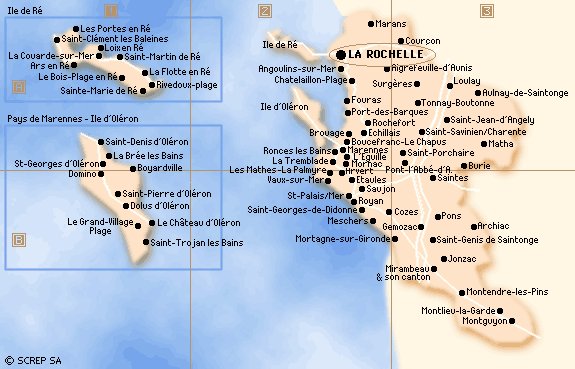http://worldfacts.us/France-La-Rochelle.htm

Taken as a whole, the history of the city of La Rochelle appears somewhat like a succession of times of crisis and periods of economical and cultural growth. From this past, that goes back over a thousand years, the inhabitants of the city have inherited of a taste for independence and innovation.
The town of La Rochelle appeared around the ninth century, and to begin with it was little more than a small village where surrounding marsh inhabitants gathered. Bit by bit, the town structure evolved and the first harbour was built during the twelfth century.
Several weddings between lords' families brought the town under English rule from 1360 to 1453. Following this period many Anglo-Saxon traditions remained, particularly religious ones. Indeed, the city became a Protestant stronghold from the middle of the sixteenth century onwards.
This history has formed the character of the inhabitants of La Rochelle, who are independent and often unwilling to accept change imposed from above. One proof if necessary: the siege of La Rochelle, which took place between 1627 and 1628, between the Protestant city and its English allies, and the Catholic French crown, and ending with the bloody defeat of the city.
Following this, the whole region was militarised and if you walk through the city you can still see numerous fortifications, such as la tour de la Chaîne built in the 14th century and la tour de la Lanterne erected a century later; as well as many other strategic sites in the area which were built under the reign of Louis XIV, like la corderie royale in Rochefort, which dates back to 1666.
From the 16th century onwards, La Rochelle expanded rapidly, thanks to trade exchanges with colonies and foreign countries, which took place in the harbour, now called le vieux port. This opening on to the world allowed the town to expand and evolve. New avenues, squares and monuments were erected, such as l'hôtel de la Bourse and la Grosse Horloge, both built in the 18th century and proof of the commercial power of the town.
During the French revolution (1789-1799), life was relatively peaceful in the city, especially in comparison with nearby places such as Rochefort, where the clergy was violently purged, and the Vendée area, where a counter-revolutionary uprising took place, leading to a bloody civil war between monarchists and republicans throughout 1793.
However, dark years hit the city with the Empire wars (1805-1815), between napoleonic France and the rest of Europe, which destroyed much of the city's trade. Only during the second half of the nineteenth century was La Rochelle again to enjoy flourishing trade: coal imported from England, wood from Northern European countries, as well as rum and sugar from the West Indies. The town carried on expanding with the creation of the parc Charruyer, for example, and even more so with the construction of la Pallice harbour in 1896, which was first a trade port, then a fishing harbour, before becoming the greatest oil port of the Atlantic coast.
At the beginning of the twentieth century, the city was blooming, open to the whole world, but also well developed on a more local scale. Indeed, it is during this period that the university was opened, as well as many administrative centres and several museums, such as the musée du Nouveau Monde.
Since this time La Rochelle has often been at the heart of important events, like during the Second World War, when the city, having been taken by the retreating German army, was the scene of much fighting until the very last day of the conflict, May 8th 1945.
It was after the war that tourism began to grow in La Rochelle, as well as in nearby places such as Ré island, Châtelaillon-Plage, Oléron island and even Rochefort.
Economic development hasn't been limited to tourism however and today the city is home to many industries such as shipbuilding, which date back to the industrial revolution, train-building and chemical industries, which have existed since the 1920's, as well as numerous recent aquaculture companies.
Today, La Rochelle is still permanently innovating; the presence of many electric vehicles within the city is one of the many examples of the will of the inhabitants not to go against this tradition of modernity.
